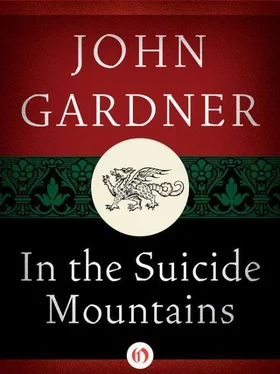‘Dark night came. Suddenly a window opened and thieves broke in, bringing with them all that evening’s loot, silver coins and gold coins, silver and gold candlesticks, and cups of solid amber, treasure enough to keep a king. The thieves ran straight to the casket to use it for a counting table. The peasant and Nikita’s wife ducked down quickly behind the altar while the thieves counted their treasure and put it all in sacks. Then the thieves opened the casket and discovered, to their surprise, the wealth of Nikita the Mean, all packed around the body. ‘This is a lucky night for us,’ they cried. ‘Praise God!’ And they sent out for more bags and began putting into them all Nikita’s treasure. Nikita gritted his teeth in agony, but he would not cry out because there was always the chance that the thieves might be taken and the treasure recovered, whereas that kopek would be gone forever if that peasant got ahold of it. Soon the treasure was all bagged and tied except for Nikita’s golden saber, and this the thieves began to quarrel about. The peasant suddenly jumped out and cried, ‘Let me settle this dispute! Whoever cuts off the dead man’s head shall have the saber!’
’At this Nikita the Mean jumped up, beside himself with fear, and just in the nick of time, too! If he’d played dead another half second he would have been deader than he wanted. The thieves, too, were frightened, and abandoning the money, both Nikita’s and their own, they took to their heels. ‘Now, little peasant,’ said Nikita, ‘let us share the robbers’ money, and since I worked the harder for it, I shall have the most.’ They shared it as Nikita the Mean thought right, and even so, both of them got a great deal. ‘And how about my kopek?’ said the poor man. ‘Ah, dear brother,’ said Nikita, ‘you can see for yourself I have no small change.’ And Nikita the Mean never did return the kopek, but lived happily ever after.”
It’s an interesting story”, said the prince, after a nod from Armida, “but I’m not sure why you tell it.”
“Well, not solely for the moral,” said the abbot with a smile. “As the world rolls on, I grow less and less interested in the moral. But it’s true, as the story teaches us, there’s a curious rigidity in human nature, especially when we get older. It’s easier to heal the sick or give blind men sight than it is to part a miser from his kopek — or a murderer from his knife. The miser may hate himself, as did Nikita the Mean; the murderer, if he has any sensitivity at all, may become, in his own eyes, so thoroughly repugnant that he spends half his days and nights out at the edges of cliffs, praying to God for the nerve to jump. Nevertheless, you know, a habit’s hard to break. You get a vision, one way or another, of what you’d like to be — perhaps a vision of yourself as the world’s greatest monster, if you happen to encounter the right books and friends. If you decide, for one reason or another, you don’t like that, you discover to your sorrow, if you’ve worked very long at becoming what you are, the new vision’s impotent to change you.”
Prince Christopher sipped his brandy, his eyebrows raised. “And this may have happened, you think, to the six-fingered man — that is, he’s become, to himself, repugnant?”
“I could swear to it, my prince, happiness of my days! Not that that makes him less dangerous, of course. On the contrary, despair gives a murderer an advantage. We spoke earlier, you recall, of the advantage indifference to life might give you with the dragon. But a murderer who’s broken all God’s laws and man’s and has no hope for his soul — who has , in fact, no soul — that murderer has the same advantage you had. Had , I must add, and have no longer. You’ve gotten interested again; you’ve abandoned your idea of committing suicide. That makes you vulnerable. He, on the other hand, the six-fingered man, of what concern is it to him which one of you dies, whether you die or he dies? His hand, therefore, will not tremble. His eye will not misjudge.”
He glanced at Armida, who sat watching in what seemed worried silence, with her eyes now on Prince Christopher, now on the abbot.
“Nor is that all,” said the abbot. “The six-fingered man is more solitary even than Koog the Devil’s Son. Oh, he has his men. Cutthroats, purse-snatchers. He could see them all hanged in a minute and never blink an eye. He has no kind, stern father, concerned, as yours is, that his son be worthy of the world’s respect and friendship. No mother, such as yours, who fusses over him, praising his weaknesses, begging him to put on galoshes when it rains, swooning with pride and pleasure when he plays the violin or composes a lyric. The six-fingered man has nobody; nothing snarls his feet. In the blackness of his despair he has cut away all ties. You, on the other hand, have not only your parents and Armida and the dwarf, you have a whole wide kingdom of admirers who love you as I do. You have more friends than most men to worry about. So you’ll glance around behind you, when you meet with the man, making sure that Armida’s out of reach and the dwarf not sleeping. Your hand will tremble, my son; your eye will misjudge.”
“Perhaps that’s so,” said the prince. “We’ll have to see.” Armida said, “He’ll just have to do his best, father.” “Yes he will,” the abbot said and smiled. “He certainly will.” Now he turned away and walked to the window to look out, whether at the stars and the full moon or down at the cliff I cannot say. It’s a beautiful night,” he remarked. “Would anyone care to walk out in it?”
“ That would be lovely!” Armida said. She sat forward in her chair, ready to get up.
“Let’s do it then,” the abbot said. “We could walk out by Suicide Leap, if you’re interested, and you can gaze down at the boulders and be thankful you’re not jumping.” He laughed oddly, then moved across the room toward the door. Armida and the dwarf rose behind him to follow, and the prince came last. Soon they were at the rear of the monastery, at the edge of the cliff. The stars were like thousands of bits of ice in the sky; the wind at their backs was cold. “I should have brought a wrap,” thought Armida, for her long white dress was thin. She walked with the dwarf close to the edge and peeked over— the dwarf reached up and caught hold of her hand — then backed away again, dizzy. The prince stayed where he was, several paces from the edge.
Safe in the darkness of a cypress hedge, the abbot took Prince Christopher’s arm. “I want you to know, my prince, light of my life, I’ve enjoyed these few hours we’ve had together. I don’t know when I’ve enjoyed anything more. I like a conversationalist who makes me think, but that is the least of it. I’ll say no more. And you, my two friends—” he nodded to Armida and the dwarf—“you’re wonderful company, both of you. I’ve never known better. I wish this time we’re having could last for all eternity. For various reasons, however — sad, sad reasons! — I must say—” He broke off, dropped Prince Christopher’s arm, and moved away a little. Almost imperceptibly, Armida drew more erect, and Chudu the Goat’s Son — his lips moving, for he was counting like lightning — tipped his head forward, ready to charge like a bull. (None of this, unfortunately for him, did the abbot see. Fool that he was, he was carefully not looking, watching no one at all but Prince Christopher.)
When he had walked five or six paces from the prince, up the hill from him, toward the dark, looming monastery, the abbot turned around. In the moonlight his smile seemed no longer kind and gentle but transformed to a ghastly grimace. Me had his hands at his sides, unhidden now. “There is one thing more I can do for you, Prince,” the abbot said. “You’re looking for the notorious six-fingered man.” He paused dramatically (he’d spent years on the stage), then stretched his hands out so the three of them could see. “Here he stands!” he said. He held his hands out a moment longer, making sure the shock registered. Then, as if casually, he moved his right hand to the front of his cassock, reached down inside the collar and, with a lightning-quick motion, drew out a sword. Armida gasped in spite of herself and clasped her hands together at the waist. With her left hand she reached two fingers down into her belt for the penknife she’d hidden there.
Читать дальше












